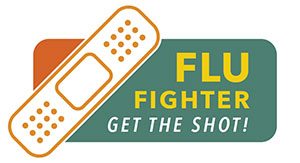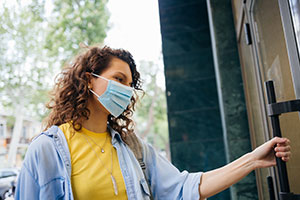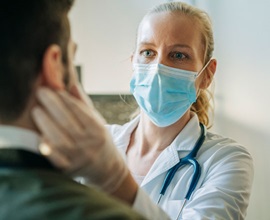

We're making it easier than ever to get your flu shot.
It’s important to protect yourself and your loved ones from influenza by getting vaccinated each year. You can get a flu shot in a number of places – local pharmacies, your primary care provider, St. Luke’s, or other local health care providers.

Schedule Your Flu Shot at a St. Luke's Clinic Near You
To get your flu shot at a St. Luke's Clinic, please schedule an appointment through MyChart. If you aren’t registered for MyChart, sign up today. You can also make an appointment by calling your primary care provider.
FAQs
Click each question below for its answer:
Flu is a contagious respiratory illness caused by influenza virus. It can cause mild to severe illness, sometimes leading to death. Flu almost always causes symptoms in those who are infected.
Coronavirus disease 2019 (COVID-19) is a disease caused by the virus SARS-CoV-2, which has triggered a global pandemic. It can cause mild to severe illness, sometimes leading to death.
A key difference is that many people with COVID-19 can have mild symptoms or no symptoms at all. This makes it difficult to distinguish between infected and non-infected individuals and made it difficult to contain the pandemic. People with no symptoms can still transmit the SARS-CoV-2 virus, which rarely happens with influenza.
For a comparison of influenza and COVID-19 check out Similarities and Differences between Flu and COVID-19.
The flu, like the virus that causes COVID-19, can spread from person-to-person between people who are in close contact with one another, within about 6 feet. Both are spread mainly by large and small particles containing virus that are expelled when people with the illness (COVID-19 or flu) cough, sneeze or talk. These particles can land in the mouths or noses of people who are nearby and possibly be inhaled into the lungs. In some circumstances, such as indoor settings with poor ventilation, small particles might be spread further than 6 feet and cause infections.
Although most spread is by inhalation, it may be possible that a person can get infected by touching (for example, shaking hands with someone who has the virus on their hands) or by touching a surface or object that has virus on it, and then touching their own mouth, nose, or eyes.
Both flu viruses and the virus that causes COVID-19 can be spread to others by people before they begin showing symptoms; by people with very mild symptoms; and by people who never experience symptoms (asymptomatic people).
Source: CDC - Similarities and Differences between Flu and COVID-19
Yes. The best way to protect yourself and your loved ones against influenza is to get vaccinated every flu season as the viruses change and vaccines are updated. The CDC recommends everyone six months and older get an annual flu vaccine. Flu vaccination has been shown to reduce severity of illness. It takes about two weeks after vaccination for antibodies that protect against flu to develop in the body.
It’s also important to maintain vaccination schedules for all vaccines, especially for children. Many children have gotten behind on their important childhood vaccinations that protect them from diseases like polio, measles, and bacteria that cause childhood meningitis. Maintaining vaccination schedules helps prevent unnecessary illnesses and reduces the risk of illness and spread throughout the community.
Yes. Flu vaccines and COVID-19 vaccines can be given at the same time, according to the CDC.
Source: CDC - Frequently Asked Influenza (Flu) Questions: 2022-2023 Season
If you develop symptoms of flu or respiratory illness, get tested. Please follow these steps:
- If you think you may have symptoms of COVID-19, or may have been exposed, please use our self-triage tool in myChart first; it will help you determine what to do next. If you don’t have a myChart account, you can create one online here.
- If self-triage indicates that you should be tested, you will be able to schedule an appointment through myChart at one of our designated clinic locations. Please note: you must have an appointment for testing, we are unable to accept walk-ins.
- If you are experiencing severe symptoms and need immediate assistance, go to the nearest emergency department.
A yearly flu vaccine is the first and most important step to protect against flu. Everyone six months or older should get an annual flu vaccine. Find COVID-19 vaccine information here.
To prevent the spread of flu or COVID-19, use the “three W” infection-prevention practices:
- Wash your hands with soap and water for at least 20 seconds or use alcohol-based hand sanitizer.
- Wear a mask in public, whether indoors or outdoors.
- Watch your distance—keep six feet from others and avoid close contact with those who are sick.
- If you’re sick, stay home. Private parties and large gatherings are well-documented sources of outbreaks, so avoid them.
Yes, masks have been shown to significantly reduce rates of transmission.
Follow local ordinances and CDC guidelines, and err on the side of caution. Wear a mask in public, particularly in indoor and enclosed spaces. Wear one in places where physical distancing is difficult to maintain, such as grocery stores and pharmacies, especially in areas of significant community-based transmission.
Yes. A yearly flu vaccine is the first and most important step in protecting against flu. Everyone six months or older should get an annual flu vaccine. The flu vaccine has been shown to reduce the risk of getting sick by flu and has been shown to reduce hospitalization from flu. Getting the flu vaccine early (typically in the fall) helps reduce the illness burden in the community.
Flu antivirals are available by prescription. Antiviral drugs are somewhat effective in treating flu illness, can make illness milder, and can shorten the time you’re sick. They can also prevent serious flu complications. Antiviral drugs should be used early on to treat people who are very sick with flu and people who get flu symptoms who are at high risk of serious flu complications, such as the elderly or those with medical conditions.
There are multiple strains of flu in any given flu season. Since a vaccine is only able to target a limited number of strains each year, you may be protected from one strain but not another.
Are You Sick or Injured?
Use Our Symptom Checker for Advice
The information in our symptom checker is designed with patient safety as the highest priority. Each care guide is reviewed by physicians, specialists and nurses for accuracy.
If you need additional advice regarding your sickness or injury, please contact your provider.
Access On-Demand Virtual Care!
COVID-19 Resources
Navigating COVID-19 Together
St. Luke's is prepared to support our patients and community as we enter the fall flu season with COVID-19 still spreading across Idaho. Our commitment to safe care includes coronavirus testing, visitor screening, enhanced safety practices and more.


